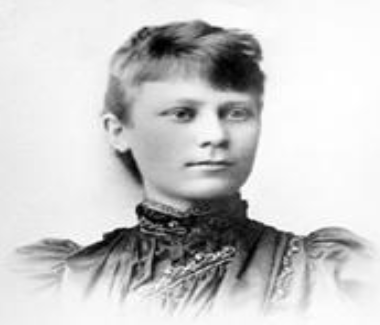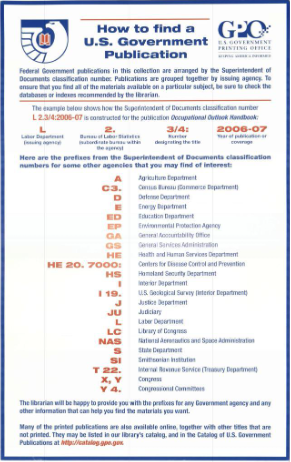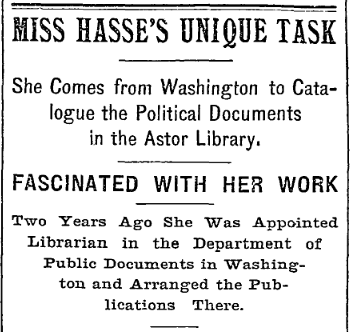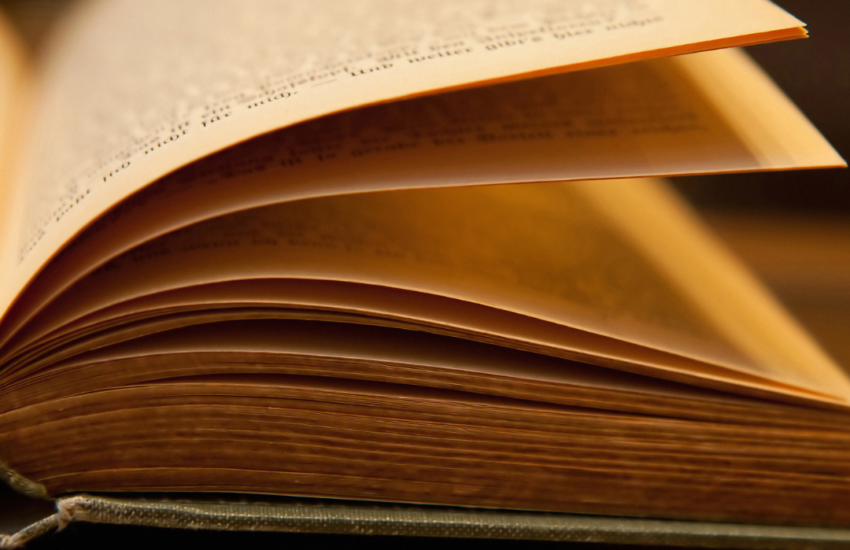Adelaide Hasse: The GPO’s Founding Mother of the SUDOC Classification System
By Thomas Giangreco, Walsh Library – Gov Docs, Microforms, and Digitization
Have you ever come across a call number that looks something like this in the library catalog: Y 1.1/5:109-322?* “What is that?”, you might have asked yourself. It’s not a Library of Congress call number or a Dewey Decimal System number. It’s a Superintendent of Documents number, or SUDOC for short, and it is used to classify documents produced by the Government Publishing Office (GPO). And, did you know that the entire SUDOC system is the brainchild of one remarkable, but largely unknown (to the general public, at least) woman: Adelaide Hasse.

Born on September 13, 1868 in Milwaukee, her family moved to southern California and in 1889 she went to work at the Los Angeles Public Library. Interestingly, there is no record of Adelaide having any formal education in library science. What she did have was an intuitive knowledge of libraries, a capacity for hard work, and a gift for organization. In 1891, the Los Angeles Public Library joined the Federal Depository Library Program (FDLP), and Adelaide had her first introduction to the world of Government Documents. What are Government Documents? Simply, they are anything published by the Government Publishing Office (GPO), or in her day the Government Printing Office, which opened on March 20, 1861, the same day President Lincoln was inaugurated, in Washington D.C. The mission statement of the GPO is “keeping America informed” by making available virtually everything produced by the various branches and departments of the government that is not deemed classified or secret.
Adelaide was confronted with a massive amount of material to organize and catalog. Unhappy with the Dewey Decimal System, she set about creating a classification system all her own beginning, sensibly enough, with the Agriculture Department. She developed a system organized not by title or author, but rather by department. A for agriculture, D for defense, T for treasury, etc. It may seem confusing at first, but it has a strict and coherent internal logic.**

In 1895, She left the Los Angeles Public Library for Washington, D.C. and a job at the Government Printing Office. It was here, in the nation’s capital, that her work with Government Documents reached its zenith. Her task involved archeological work as much as librarianship. She had to first uncover documents that were stored in every nook and cranny of the government’s buildings, often crawling through hard-to-reach places inside walls and ceilings to find the material and then having it transported to the GPO. Once in her hands, Adelaide applied the classification system she had invented in Los Angeles for the Agriculture Department publications. Her efforts were even chronicled in a June 2, 1897 article in the New York Times. The reporter for the Times began his interview by stating “you have the reputation of knowing more about political documents than any other woman.” In the Times article she described her work and the condition of the government’s massive collection of papers as “perfect chaos” and it is noted that she retrieved 160,000 volumes from the Interior Department alone!
You might think that this achievement would have assured her respect and professional success, but, sadly, that was not to be. She moved on to the Government Documents Division of the New York Public library, but she did not last there, being considered “difficult” to work with. At one point, she was even the target of what would now be considered sexual harassment from none other than Melvil Dewey (he of Dewey Decimal System fame). And if this were not enough, with the outbreak of World War I she was targeted for her German ancestry. An FBI file was even opened on her.
Adelaide Hasse moved around from one library and government job to another for the rest of her career. She died on July 28, 1953. If you haven’t heard of her, that’s understandable, but she is someone who can and should be remembered as a pathfinder with a genius for creative organization, even if her name is not a household one like Susan B. Anthony, Amelia Earhart, or Eleanor Roosevelt.
So come down to the Walsh Library basement, visit Fordham’s Government Documents collection, and tip your hat to the founding mother of the SUDOC system!
Further Reading
The Library of Congress has the Adelaide Rosalia Hasse Papers in its manuscript collection:
There is a nice Wikipedia entry on Adelaide Hasse
ArcGis StoryMaps has an excellent illustrated article entitled “Adelaide in DC” covering her time at the
For more on the origins of the SUDOC system see: Gail K. Nelson and John V. Richardson, Jr., “Adelaide Hasse and the early history of the U.S. Superintendent of Documents classification scheme” in GOVERNMENT PUBLICATIONS REVIEW vol.13, iss.1 (Jan-Feb 1986)
To find out more about the life and career of Adelaide Hasse there is an excellent biography by Clare Beck, The New Woman as Librarian
*If you are wondering, this is the congressional report on Hurricane Katrina.
**The only branch of government that is not immediately obvious in the SUDOC system is the congress, which is classified under X and Y.
Curious about other government documents available through the Fordham Libraries? Visit our Government Documents research guide to learn more.
Fordham has been a proud member of the Federal Depository Library Program (FDLP) since 1937. The FDLP is devoted to the mission of “keeping America informed” by the free-of-charge dissemination of non-classified government information and publications to participating libraries. You can find the Federal Register and Congressional Record, transcripts of congressional hearings, the Congressional Serial Set going back to 1789, United States Supreme Court Reports, and a multitude of federal department publications from every branch of the federal government. From the earliest acts of congress to the Mueller Report, our Government Documents collection is a primary source history of the United States government in one location.
Dr. Thomas C. Giangreco
Walsh Library – Gov Docs, Microforms, and Digitization



